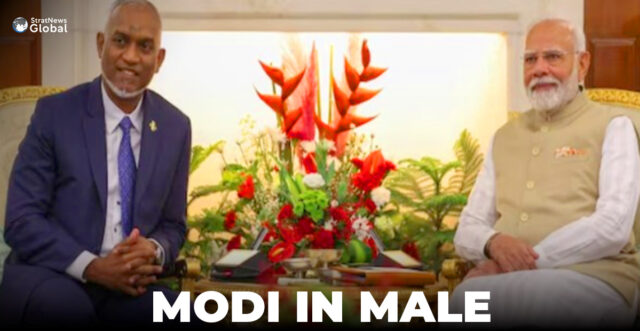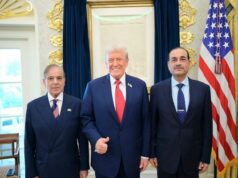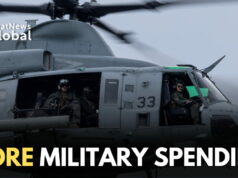When Prime Minister Narendra Modi lands in the Maldives on July 25 for a state visit, it will mark more than a ceremonial moment on a neighbour’s national day.
His presence as Guest of Honour at the island nation’s 60th Independence Day celebrations signals a reset in relations, and a pushback against deeper, more structural shifts in the region.
At stake is not just the future of India–Maldives ties, but India’s position in a rapidly evolving Indian Ocean geopolitical order.
The visit comes amid fresh Chinese moves to cobble together an alternative to SAARC—one that includes Pakistan, Bangladesh, and possibly even Nepal, Bhutan, Sri Lanka and the Maldives—essentially freezing India out of the regional multilateral frame it once led.
In that context, Modi’s trip is both symbolic and strategic. It also comes at the tail end of a broader diplomatic sweep: just days before heading to Malé, the Prime Minister will be in the United Kingdom (July 23–24), where he is expected to sign the long-awaited India–UK Free Trade Agreement.
Modi’s third visit to the Maldives as Prime Minister (but the first since Muizzu assumed office in 2023) underlines not only India’s global diplomatic ambition but also its determination to secure strategic ground in its own backyard.
Relations between New Delhi and Malé had hit a rough patch under Muizzu’s leadership, with the “India Out” campaign, controversial public remarks by Maldivian ministers, and a clear pivot toward China defining the early phase of his administration.
But recent months have seen a quiet reversal. India’s decision to replace military personnel with civilian technical staff, extend a $400 million currency swap, and increase credit lines helped cool tensions. Meanwhile, Muizzu’s government has visibly moderated its tone, actively seeking Indian investment and cooperation to shore up its struggling economy.
Modi’s visit is set to consolidate this rapprochement. Talks between the two leaders will review progress under the India–Maldives Joint Vision for a Comprehensive Economic and Maritime Security Partnership, and the two sides are expected to sign several MoUs in areas ranging from infrastructure and health to digital payments and trade.
This bilateral warmth comes against the backdrop of a far more ambitious and potentially destabilising regional trend.
China, with support from Pakistan and encouragement from segments in Bangladesh, is reportedly attempting to stitch together a new regional forum that could rival or replace SAARC, which has been effectively defunct due to India–Pakistan tensions.
This emerging grouping, sometimes dubbed an “Alternative Asian Forum,” aims to sideline India’s centrality in South Asian affairs, while embedding Chinese influence through economic integration and strategic alignments.
For the Maldives, which has received extensive Chinese investment through the Belt and Road Initiative (BRI), the temptation to align with such a grouping is real, even if fraught with risk.
Modi’s visit to the Maldives is a pointed reminder that New Delhi will not vacate space in its own extended neighbourhood, even as China tries to redraw the diplomatic map. It also demonstrates India’s preference for bilateral partnerships grounded in transparency, infrastructure delivery, and regional security cooperation over opaque, debt-heavy alternatives.
While much of the coverage will focus on ceremonial moments and photo-ops, the visit is expected to produce tangible outcomes:
Infrastructure & Connectivity: The flagship Greater Malé Connectivity Project (GMCP), funded by India, is expected to see a progress review, possibly along with announcements related to housing, sanitation, and water projects.
Economic & Digital Cooperation: Expansion of UPI-based digital payments in the Maldives is on the table, along with new trade facilitation measures.
Maritime Security: Enhanced cooperation on coastal surveillance, maritime domain awareness, and disaster response will feature in bilateral talks.
Political Optics: A joint statement will likely reiterate commitment to regional peace, democratic values, and non-interference, implicitly pushing back against China’s coercive diplomacy.
Modi’s decision to prioritise the Maldives immediately after a major diplomatic engagement with the UK is carefully calculated. It sends a clear signal not just to Malé, but also to Colombo, Dhaka, and Kathmandu, that India remains the most stable, consistent, and responsive partner in the region.
It also reinforces New Delhi’s twin doctrines of Neighbourhood First and Vision MAHASAGAR (Security and Growth for All in the Region), anchoring India’s regional leadership on the basis of mutual respect, connectivity, and trust.
Crucially, it tells Beijing that attempts to reshape the South Asian regional architecture without India will be challenged: not through sabre-rattling, but through sustained diplomacy, infrastructure delivery, and strategic outreach.
Prime Minister Modi’s visit may not erase all the irritants of the past year, but it marks a new phase—more pragmatic, less sentimental—in India–Maldives relations.
For Muizzu, it’s a recognition of Maldives’ economic and geopolitical realities. For Modi, it’s a reaffirmation of India’s centrality in South Asia, and a timely counter-move to a growing Chinese footprint.
In a career spanning three decades and counting, Ramananda (Ram to his friends) has been the foreign editor of The Telegraph, Outlook Magazine and the New Indian Express. He helped set up rediff.com’s editorial operations in San Jose and New York, helmed sify.com, and was the founder editor of India.com.
His work has featured in national and international publications like the Al Jazeera Centre for Studies, Global Times and Ashahi Shimbun. But his one constant over all these years, he says, has been the attempt to understand rising India’s place in the world.
He can rustle up a mean salad, his oil-less pepper chicken is to die for, and all it takes is some beer and rhythm and blues to rock his soul.
Talk to him about foreign and strategic affairs, media, South Asia, China, and of course India.





